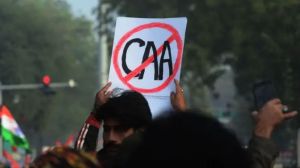Maya muddies Gandhi’s legacy
The Russian revolutionary, V.I. Lenin, used to believe ‘revolution was the festival of the masses’. Lenin’s contemporary, Mah...

The Russian revolutionary, V.I. Lenin, used to believe ‘revolution was the festival of the masses’. Lenin’s contemporary, Mahatma Gandhi, did not believe in violent revolutions. Yet his path of civil disobedience left a lasting legacy in this country. The political analyst Morris-Jones calls it the ‘movement legacy’ of Indian politics. Gandhi’s satyagraha has become the model for today’s hunger strikes, protests and rallies.
Cut back to last Saturday in Lucknow, where one saw the most awesome collective spectacle of recent times: the dhikkaar rally organised by UP CM Mayawati. The ride from Amausi airport to the Ambedkar stadium was an indescribable visual delight: the sight of mostly Dalit men and women—their heads bowed down, walking in unison on the roadside, their little blue banners sticking out prominently, etched with the elephant (the BSP poll symbol) — was immensely uplifting. Their little packets of food brought from home bobbing up and down in rhythm with their nimble footwork looked so impressive that even an actual army couldn’t have been more disciplined. Seemed like an apt script for V.S. Naipaul’s India: A Million Mutinies. Democracy appeared at its best.
Therefore the weekend tragedy at the Charbagh railway station which took 20 lives and led to hundreds getting injured in a stampede sounds peculiarly puzzling. The intense drama, excitement and enthusiasm of the morning turned into horror by nightfall. It could only have been due to the failure of the administration of which there was abundant evidence. There was hardly enough provision of drinking water for the millions, who were thirsting it out under a scorching sun, let alone any official arrangement of food. It was equally disastrous in terms of toilet arrangements or medical supplies. The limited facilities were reserved for the officials, the media and VVIPs sitting under the shade. Governance appeared at its worst.
A chat with some of those who had arrived from hundreds of kilometres proved to be an eye-opener. Mira Devi, a 70-year old Dalit woman, had come all the way from Hardoi, 104 km from Lucknow. Her sister, 50-year-old Rukmini, had come from Akbarpur, even further away. Neither had had enough food in the last few days and were visibly low on liquids. They had hardly slept for the last two nights, shacking up on the railway platform. Despite no help from the administration, there was enthusiasm in their eyes, which might have dimmed after that dreadful experience in the station. People, despite official malfeasance, continue to have faith in democratic symbols.
One witnessed unsavoury scenes during the meeting. Several rally organisers (read hoodlums) armed with batons, were openly roughing up people packed like sardines inside bamboo enclosures. The police of course behaved like police, lathi-charging at the slightest provocation. The shortage of special trains and buses for return journeys has been extensively reported and was perhaps the reason for the tragedy. The carelessness translated into disaster. Democracy began appearing more like tyranny.
The Mahatma, who led the national movement, had an organic relationship with the masses. He did not need the organiser’s batons to control them. He blamed himself morally and undertook penance when violence broke out during the historic protest in Chauri Chaura.
Rallies, today, have become the apt metaphor of the schizophrenia that characterises Indian democracy — conjuring up the most populist of symbols for mobilising millions yet in total disregard for any act of governance. It is a cynical Schumpeterian notion of democracy where politicians compete for people’s vote without that translating into any benefits.
Last weekend’s Dhikkaar rally reflected that schizophrenia. After 20 deaths due to official negligence all we have is an official inquiry commission, a pittance of Rs 1 lakh for each of those killed, and free medicines to those who were injured. What a mockery of the Mahatma’s legacy in the world’s largest democracy. The ordinary citizens’ lives have become awfully cheap in India, where no leader cares for individual rights. In the name of empowerment, populists organise rallies to flaunt their strength, using them as bargaining tactics. They are neither accountable to the people nor to their supporters. Mayawati, the charismatic symbol of Dalit politics, is unfortunately, no exception. Even Ambedkar would not have approved.



- 01
- 02
- 03
- 04
- 05




























